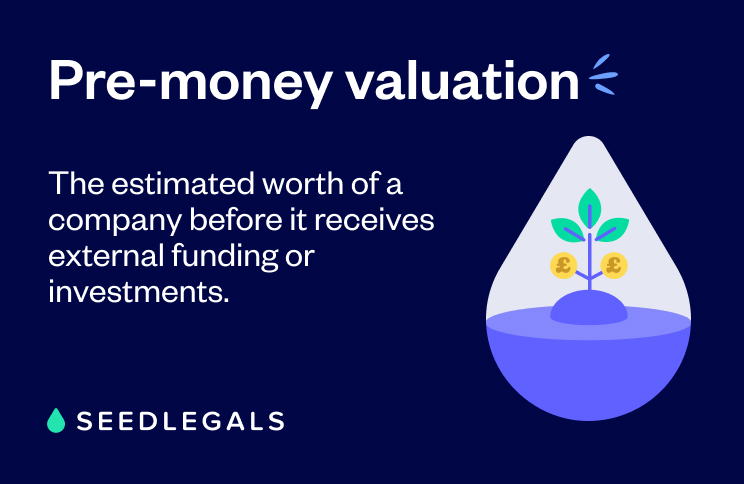How to amend a Delaware Certificate of Incorporation
Need to amend your Delaware Certificate of Incorporation? Learn how to file share changes or updates smoothly with or wi...


Your company’s pre-money valuation is important to understand how much equity you’ll offer in exchange for the investment you receive.
In this article, we’ll explain what a pre-money valuation is and highlight the key factors that influence it. We’ll also clarify the difference between the meaning of “post-money” when used in a post-money cap SAFE versus a “post-money valuation” when used for a funding round. Getting this wrong can be a costly source of confusion for some founders.
A pre-money valuation is the valuation of a company before new funding or investment is added. It’s used by investors to determine how much ownership they’ll receive in exchange for their money.

Your company’s valuation is one factor that has investors decide whether or not to invest in your company.
The valuation also determines, as a founder, how your ownership stake will be affected by newly added investment.
Let’s say an investor is putting $50,000 into your company and will receive stock in exchange.
For the investor, a lower valuation is better for them as they’d be able to buy more stock (and therefore a larger percentage of the company) for the $50,000. On the other hand, as a founder you want to be able to sell less equity for more money – which you could do with a higher valuation.
The table below shows how this $50,000 investment would look in two different valuation scenarios. Where the company’s valuation is higher, you can receive the same amount of money but offer a smaller piece of your company.
To calculate the price per share of your round, divide your company’s pre-money valuation by the total number of shares (including the share option pool) before the investment (we’ve assumed 100,000 shares here, including the option pool).
| Company’s pre-money valuation | $500,000 | $1,000,000 |
| Number of shares in the company before the investment | 100,000 | 100,000 |
| Price per new share | $5 | $10 |
| Amount invested | $50,000 | $50,000 |
| Number of shares received by new investor | 10,000 | 5,000 |
| % of company owned by new investor | 9.09% (10,000 ÷ 110,000) | 4.76% (5,000 ÷ 105,000) |
But, as a founder, you also don’t want an overly inflated valuation of your startup. With a big valuation, you could raise investors’ expectations – and if you don’t deliver on that, you might have to drop your valuation at your next round. This is a problem for a few reasons – the main one being that a drop in valuation can signal to investors that your company might be struggling, hurting investor confidence. Plus, if your valuation falls in the next round (called a ‘down round’), you might need to issue more stock to raise the same amount of money, which would lead to more dilution for your existing stockholders.
Pre-money valuation is the valuation of a company before it receives external funding or investments. And post-money valuation is the valuation after investment is added.
Let’s run through an example.
UnicornTech has a valuation of $1 million before they’ve received any investment – so, this is its pre-money valuation.
It then receives $500,000 equity investment from an investor. The value of the company is now $1.5 million – which is the post-money valuation ($1 million pre-money valuation + $500,000 investment).
| Company | UnicornTech |
| Pre-money valuation | $1,000,000 |
| Investment amount | $500,000 |
| Post-money valuation | $1,500,000 |
When you talk to investors, using post-money valuations makes it easier to calculate the share of a company that investors will receive. In the example above, a $500,000 investment at a $1,500,000 post-money valuation means investors will be left with 33.3% of the company.
But, the problem is that the post-money valuation will change depending on the amount being raised, so e.g. if it turns out that you can only find $400,000 in investment, then the post-money valuation will be $1.4M.
This means that the post-money valuation is a moving target, and it’s really problematic if you have to keep telling your investors a different post-money valuation as the round size changes. For this reason, we suggest always talking about a pre-money valuation for a priced funding round.
Either way, when you’re negotiating an investment deal, you must be clear on whether you’re talking about pre-money valuation or post-money valuation in your term sheet otherwise there’s a problem later if investors thought you were talking about a pre-money valuation, you were talking post-money, and now they have less equity than they were expecting.
A SAFE is a way to get money from investors now in exchange for the right to receive equity in a future funding round (typically at an agreed valuation cap). When raising money using YC post-money cap SAFEs, it’s easy to assume that the valuation cap listed in the SAFE is the same as your company’s future post-money valuation. But that’s not how it works – and this misunderstanding can lead to giving away more equity than you’d planned.
Imagine you raise $500,000 through a post-money cap SAFE with a $12 million cap. Later, you raise another $500,000 using the same terms – another post-money cap SAFE with a $12 million cap.
Many founders mistakenly believe that a $12 million post-money cap SAFE cap means the investment will convert at a valuation of $12 million if their next funding round valuation is that or higher.
But with post-money cap SAFEs, the valuation cap includes all SAFEs and convertible notes that are still outstanding. So, when it’s time for your next funding round and these SAFEs convert into equity, the $12 million cap is reduced by the total amount of the SAFEs you’ve issued.
In this example, you’ve already raised a total of $1 million through SAFEs. So instead of converting at $12 million, these SAFEs will convert at an effective valuation of $11 million ($12 million cap minus the $1 million raised).
For you as the founder, this can result in more dilution than you might have expected, had you not understood the way post-money cap SAFEs convert.
To avoid this, you need to keep track of all the SAFEs and convertibles you issue – because each one chips away at the valuation cap of all the SAFEs. Before signing new SAFEs, make sure you understand how they’ll impact your future equity. If you’re using SeedLegals to manage your cap table, you can visualize how future SAFEs will impact your dilution, so you’ll never get this wrong.
So what are the factors that influence the value of your company?
Determining a valuation is definitely more art than science, but here are some things that affect your valuation:
Jonny SeamanNo two startups are the same, so landing on a fair valuation is usually a big negotiation point between founders and investors. The key is to be able to justify your valuation based on the core factors mentioned above. Benchmarking your valuation against other companies in your industry is also important to ensure you’ve landed on a reasonable and substantiated number.
Investment Partnerships Manager,
Book a free call with our team to find out how we can help with your fundraise.
Want to try SeedLegals for free first? Start your 7-day free trial.
Bring all your questions - we’ve got the answers! We’ll match you with the right specialist.






